Best Care Homes For Learning Disabilities In the UK

Estimated Reading Time: 15 minutes
This article was reviewed by Hannah Karim, Customer Care Lead at Lottie, on 24th January 2025. Hannah Karim has over three years of experience within the care sector and works closely with families to ensure they find the right care option. Hannah has received training from organisations such as Mind and The National Bereavement Service, and is also a certified Dementia Friend. Next review due January 2026.
If your loved one has a learning disability and is unable to live at home - independently or with the support of a family member or friend - a learning disability care home could be the perfect environment for them.
Learning disabilities affect people differently and there are numerous types, including Autism, Asperger’s syndrome and sensory processing disorder. This makes finding the right care home suited to your loved one’s needs so important.
Many residential and nursing care homes across the UK welcome people with various types of learning disabilities. Here, we’ve looked at who learning disability care homes are for and how residents are supported, while also highlighting nine brilliant Lottie learning disability care homes that fit the bill.
Kickstart your care search
Discover the best care homes in your area through Lottie.
Who is a Learning Disability Care Home For?
A learning disability care home is for everyone who may require additional support in a home-from-home environment. They could live with any of the following conditions:
- Autism spectrum disorder
- Asperger’s syndrome
- Brain injury
- Cerebral palsy
- Down syndrome
- Prader-Willi syndrome
- Rett syndrome
- Sensory processing disorder
- Tourette’s syndrome
- Williams syndrome
How Are Residents With Learning Disabilities Supported in a Care Home?
Just like in other care homes, residents with learning disabilities receive help and support with day-to-day tasks and personal care. A learning disability care home provides a safe space for your loved ones to live. Care services are tailored to their care needs, personal preferences, and goals, while also encouraging them to remain independent where possible.
Daily tasks include things that make your loved one’s life easier on a day-to-day basis, while personal care involves providing support with everyday tasks, such as:
- Bathing and showering
- Applying lotions and creams
- Getting dressed and undressed
- Getting in and out of bed
- Foot care
- Washing and bathing
- Using the toilet
A learning disability care home often provides different activities to support residents in developing their skills. These activities could be vocational, social, educational, or life skills, all of which aim to make your loved one more independent.
For example, if your loved one has moderate learning disabilities, they may only need basic personal care in a care home. However, somebody with greater learning disabilities might struggle with mobility, speaking, hearing, and eating. In this case, staff will help with everything from drinking and eating to using the toilet.
Learning Disability Care Options
Learning disabilities can range from mild to more serious. People with learning disabilities may take longer to learn certain skills and process difficult-to-understand information. That’s why a learning disability carer helps people enjoy a better quality of life while remaining as independent as possible.
Some carers help with personal care, while others support with tasks relating to administration and communication. What’s important is that regardless of their individual needs, your loved one is treated with dignity and respect.
You and your loved one should consider all available options. This will allow for a learning disability care plan that’s centred on your loved one’s best interests and needs.
Specialist learning disability care is available in the following settings:
- Care homes
- Respite care (in a care home or at home)
- Hourly care (also known as domiciliary care or visiting care)
- Live in care
- Overnight care
Finding the right learning disability care
To find a learning disability care home, you should first speak to your or your loved one’s local council and arrange a care needs assessment. During this assessment, the council will recommend what type of care is needed.
If the council agrees to help fund your loved one’s care home costs, they’ll also help arrange the process of choosing a care home. If you or your loved one are self-funded then you can find a suitable care home yourself. In England, you’ll pay for your own care if your savings and assets (such as your home) are worth £23,250 or more).
Lottie Care Homes For Learning Disabilities
Through Lottie, you can find the best care homes that cater to a variety of learning difficulties. Below, we’ve highlighted eight of our best homes in different parts of England, each of which provides a superb level of support to your loved one relating to learning disabilities and other forms of care.
- Chetwynd House - Nottinghamshire
- Castle Park - Hull
- Glebelands - Wokingham
- Hassingham House - Norwich
- Winchester House - Rochester
- Aranlaw House - Poole
- Mercia Grange - Sutton Coldfield
- Silver Birch - Ipswich
Chetwynd House in Nottinghamshire
Chetwynd House is a wonderful care home in Nottingham which has a ‘Good’ Care Quality Commission rating across the board. This home can provide support for residents with learning difficulties.
Chetwynd House also offers expert residential and dementia care with superb facilities for older adults. These amenities, along with a homely design, mean residents can enjoy a comfortable and welcoming care home environment.
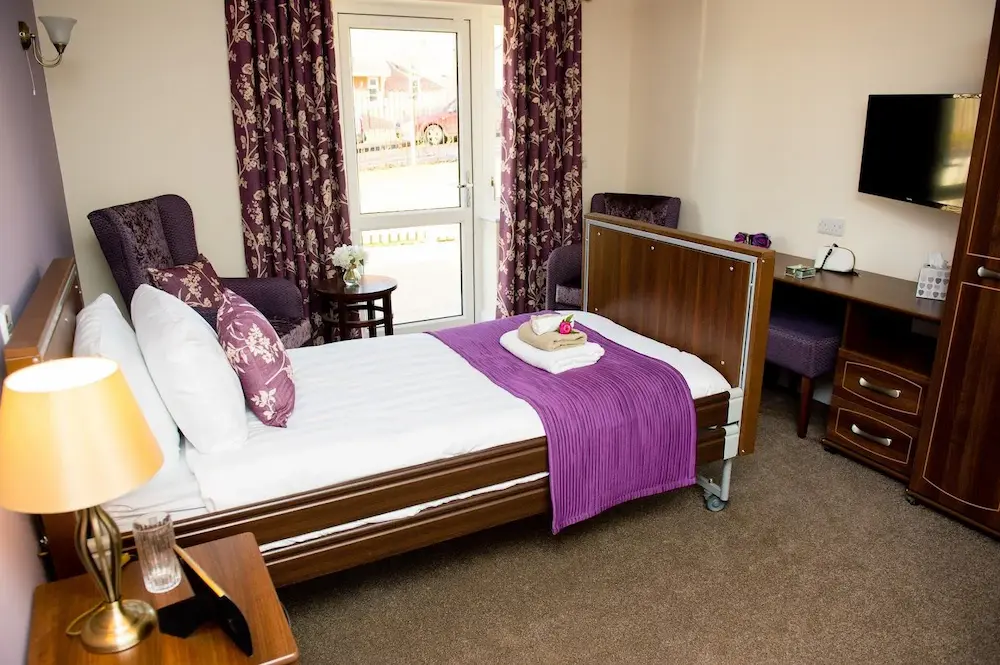
At Chetwynd House, health and wellbeing is the top priority of staff. The friendly and professional team meet numerous care needs depending on what your loved one requires, including through activities that positively impact emotional wellbeing like games, baking and day outings.
| Chetwynd House at a glance: | |
|---|---|
| Type(s) of Care Offered | The main types of care offered here are residential, dementia and respite care |
| Cost of Care | From £1,050 a week |
| CQC Rating | Good |
| Facilities, Services and Activities | A bar, a cinema, a café and restaurant, a communal dining space, a family room, lovely gardens, a beauty salon, a spa and outdoor terracing |
| Number of Beds | 75 |
| Is the Home Purpose Built? | Yes |
| Are Bills Included in the Price? | Yes |
| Are There En Suite Facilities? | All rooms have en-suite facilities |
| Which Care Home Provider Oversees This Home? | Adept Care Homes |
Are you interested in viewing Chetwynd House?
For availability and pricing, call 01156 972208.
We’re here to help you find the right care home for you or your loved one. You can request a free list of care homes from our Care Experts, who will then share homes matching your budget, location and type of care needed. You can also search for care through our easy-to-use directory.
Castle Park in Hull
Part of the Castle Care Village, Castle Park is set within a group of friendly, single-storey homes, and is one of the best care homes in Hull. At Castle Park, residents are within a short distance of the coast, with visits to local seaside resorts regularly arranged. This home provides support for younger adults - predominantly aged between 18 and working age - whose primary needs are based on physical or learning disabilities.

The range of person-centred care services at Castle Park includes 24-hour nursing care, physiotherapy and care for Huntington’s and Parkinson’s. This Barchester care home contains a wide range of useful facilities, including beautifully decorated bedrooms - many of which are ensuite - stylish lounges, airy dining spaces and well-maintained gardens where residents can enjoy the sun during the summer months.
| Castle Park at a glance: | |
|---|---|
| Type(s) of Care Offered | The main types of care offered here are residential, nursing and respite care |
| Cost of Care | Permanent care starts from £953 a week |
| CQC Rating | Good |
| Facilities, Services and Activities | This care home offers its residents an activity room, dining area and gardens. Plenty of activities are also available, such as arts & crafts, baking and various form of fitness |
| Number of Beds | 27 |
| Is the Home Purpose Built? | Yes |
| Are Bills Included in the Price? | No |
| Are There En Suite Facilities? | 67% of rooms have en-suite facilities |
| Which Care Home Provider Oversees This Home? | Barchester Healthcare |
Are you interested in viewing Castle Park?
For availability and pricing, call 01482 947519
Glebelands in Wokingham
Glebelands offers several forms of care relating to learning disabilities, including support for Autism and sensory impairments. This award-winning 24-hour nursing and residential home looks after its residents in a friendly and supportive environment. Situated just outside of Wokingham town centre in a quiet residential area, Glebelands is set amongst stunning landscaped grounds and benefits from some lovely décor.

This is one of the best care homes for learning disabilities, with almost all rooms being ensuite and having brilliant garden views, while residents can also enjoy home-cooked meals and an excellent programme of activities that are designed to keep your loved ones happy, stimulated and engaged. Many of these activities are designed with learning disabilities in mind.
| Glebelands at a glance: | |
|---|---|
| Type(s) of Care Offered | The main types of care offered here are residential and nursing care |
| Cost of Care | Permanent care starts from £1,897 a week |
| CQC Rating | Good |
| Facilities, Services and Activities | There are plenty of superb facilities at Glebelands, including an activity room, cinema, family room, gardens, beauty salon, library and terracing for relaxation |
| Number of Beds | 42 |
| Is the Home Purpose Built? | No |
| Are Bills Included in the Price? | Yes |
| Are There En Suite Facilities? | 98% of rooms have en-suite facilities |
| Which Care Home Provider Oversees This Home? | Greensleeves Care |
Are you interested in viewing Glebelands?
For availability and pricing, call 01183 384775.
Hassingham House in Norwich
This characterful care home in Norwich has been thoughtfully decorated and furnished with its residents in mind, providing a luxurious but homely experience for long-term residential and dementia care. Hassingham House is located in the Norfolk town of Hingham and is within easy reach of Wymondham and Attleborough. This home cares for younger and elderly adults, including those with learning disabilities.
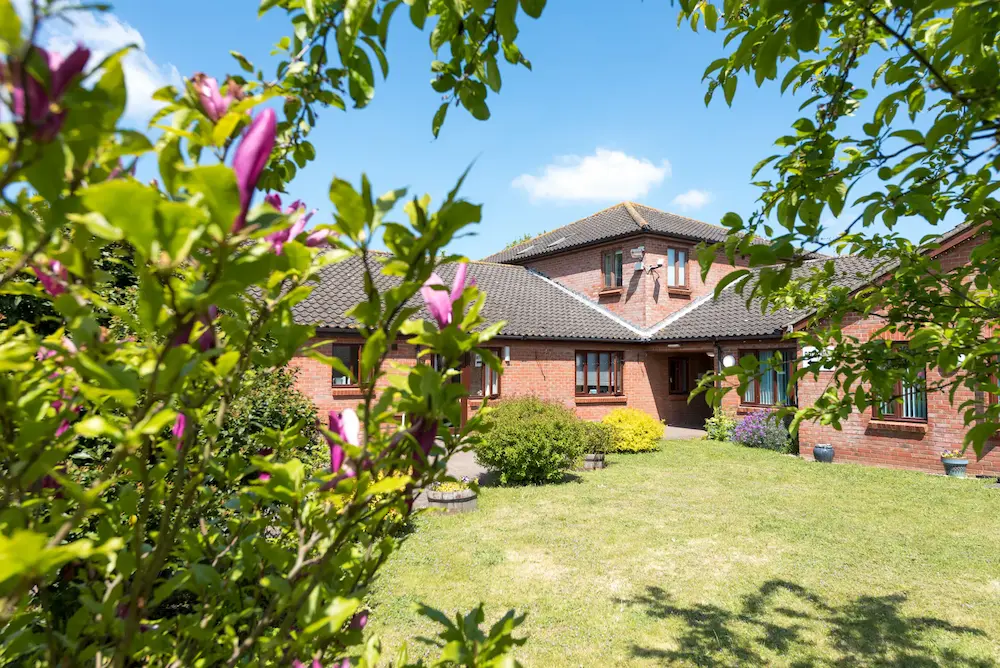
Within this lovely home, residents can enjoy several top-notch facilities, including gorgeously decorated bedrooms, stylish lounges, a hairdressing salon, extensive gardens and dining areas for communal and private dining alike. There’s also terracing, where your loved ones can enjoy watching garden wildlife pass by while soaking up the sun.
| Hassingham House at a glance: | |
|---|---|
| Type(s) of Care Offered | The main types of care offered here are residential, nursing, dementia and respite care |
| Cost of Care | From £1,500 a week |
| CQC Rating | Outstanding |
| Facilities, Services and Activities | An activity room, a café and restaurant, communal and private dining spaces, idyllic gardens, a library, a meditation room, outdoor terracing and a room dedicated to peace and quiet |
| Number of Beds | 46 |
| Is the Home Purpose Built? | Yes |
| Are Bills Included in the Price? | Yes |
| Are There En Suite Facilities? | All rooms have en-suite facilities |
| Which Care Home Provider Oversees This Home? | Forest Healthcare |
Are you interested in viewing Hassingham House?
For availability and pricing, call 01952 980434.
Winchester House in Rochester
Winchester House is the perfect home-from-home location in the beautiful countryside of Tonbridge and Mailing, and is close to the historic city of Rochester. Formally a rectory built in 1875, Winchester House has been tastefully restored to provide the best care across five separate units. This care home offers 24-hour nursing care while also specialising in care and support for people with learning disabilities and physical disabilities.

The team at Winchester House ensure the needs, interests and likes of their residents are met, with activities including things like singing sessions, cake making, cinema nights, games, quizzes and regular trips out of the home. Meanwhile, almost all of the rooms come with ensuite facilities.
| Winchester House at a glance: | |
|---|---|
| Type(s) of Care Offered | The main types of care offered here are residential, dementia, nursing and respite care |
| Cost of Care | Permanent care starts from £1,571 a week |
| CQC Rating | Good |
| Facilities, Services and Activities | At Winchester House you’ll find a dining area, gardens, a hair & beauty salon, a private dining area and a separate terrace area |
| Number of Beds | 123 |
| Is the Home Purpose Built? | Yes |
| Are Bills Included in the Price? | Yes |
| Are There En Suite Facilities? | 97% of rooms have en-suite facilities |
| Which Care Home Provider Oversees This Home? | Barchester Healthcare |
Are you interested in viewing Winchester House?
For availability and pricing, call 01634 949995.
Aranlaw House in Poole
Aranlaw House has an ‘Outstanding’ CQC rating, the highest available. Specialising in dementia care, Aranlaw House is situated on the outskirts of Poole, one of the area’s most desirable seaside towns.
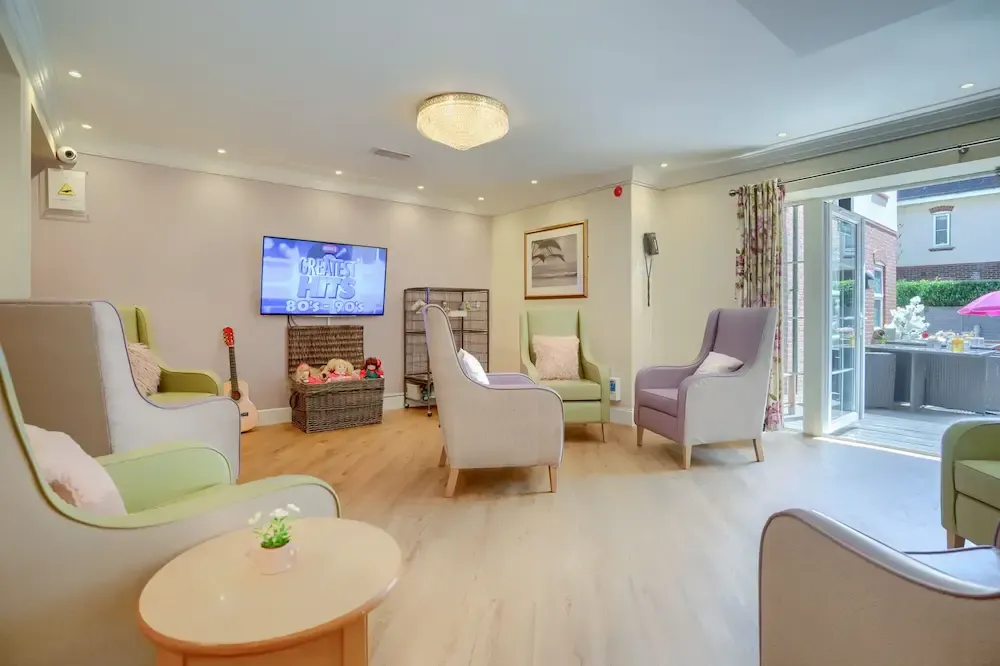
Specifically designed for people living with dementia, Aranlaw House is also suitable for people living with various learning difficulties. Several features make daily life simpler for residents to navigate, such as brightly coloured bedroom doors labelled with the names of residents, adjustable beds, and a lift that provides access to all parts of the home.
The dedicated care and activity teams ensure there’s always something for residents to do. Popular activities like baking, afternoon tea, games nights, and gardening stimulate the senses and spread joy. Day trips to the seafront and other nearby locations are equally popular.
| Aranlaw House at a glance: | |
|---|---|
| Type(s) of Care Offered | The main types of care offered here are residential, nursing, dementia and respite care |
| Cost of Care | Permanent care starts from £1,600 a week |
| CQC Rating | Outstanding |
| Facilities, Services and Activities | An activity room, a bar, a communal dining room, idyllic gardens, a hair and beauty salon, and a space dedicated to peace and quiet |
| Number of Beds | 47 |
| Is the Home Purpose Built? | Yes |
| Are Bills Included in the Price? | No |
| Are There En Suite Facilities? | All rooms have en-suite facilities |
| Which Care Home Provider Oversees This Home? | Luxury Care |
Are you interested in viewing Aranlaw House?
For availability and pricing, call 01202 099764.
Mercia Grange in Sutton Coldfield
Rated ‘Good’ by the CQC, including for the overall quality of care given and how quickly carers respond to changing circumstances and needs, Mercia Grange offers expert residential, nursing, and dementia care on a permanent or short-term basis.
Overseen by Care UK, Mercia Grange is divided into smaller sections on each floor. This separation creates calming settings and keeps the hustle and bustle to a minimum.
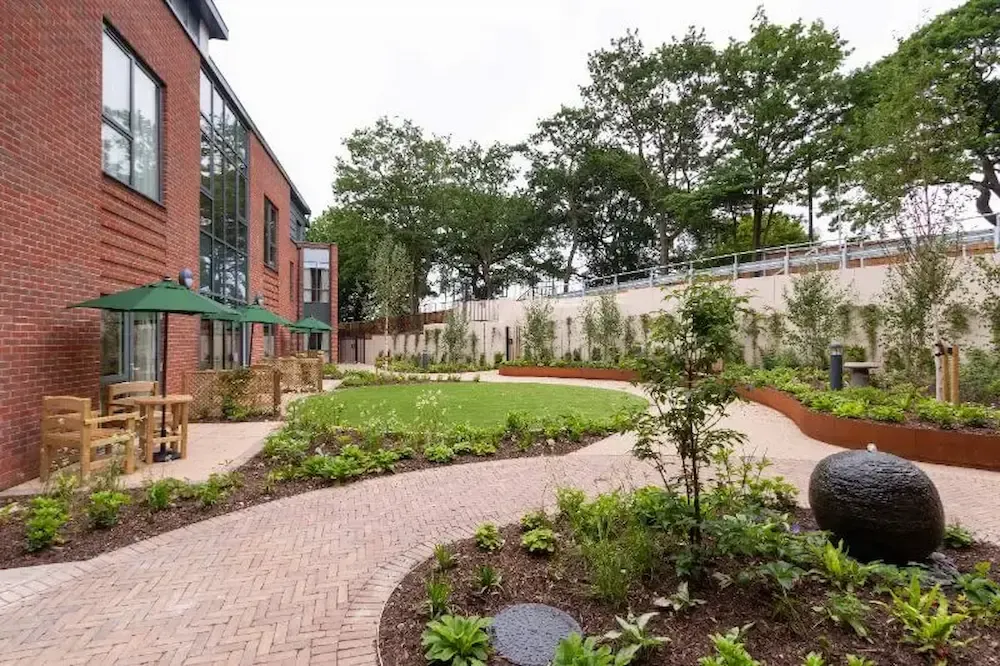
Every bedroom is spacious and beautifully decorated with an en-suite bathroom or wetroom. Meanwhile, our favourite communal facilities include a quaint café, an activity room, a cinema room, a library, a hair salon, and idyllic gardens. There’s even an on-site pub!
Mercia Grange is located in the West Midlands town of Sutton Coldfield. Residents are often taken on day trips to Birmingham and beyond in the home’s minibus.
| Mercia Grange at a glance: | |
|---|---|
| Type(s) of Care Offered | The main types of care offered here are residential, nursing, dementia and respite care |
| Cost of Care | Permanent care starts from £1,688 a week |
| CQC Rating | Good |
| Facilities, Services and Activities | An activity room, a bar, a café/restaurant, a cinema room, communal and private dining spaces, a family room, lovely gardens, a hair and beauty salon, a library, a meditation area, outdoor terracing, and an area dedicated to peace and quiet |
| Number of Beds | 67 |
| Is the Home Purpose Built? | Yes |
| Are Bills Included in the Price? | Yes |
| Are There En Suite Facilities? | All rooms have en-suite facilities |
| Which Care Home Provider Oversees This Home? | Care UK |
Are you interested in viewing Mercia Grange?
For availability and pricing, call 01216 615334.
Silver Birch in Ipswich
The care team at Silver Birch provides an exceptional standard of care in luxurious surroundings, including for people living with learning disabilities such as Autism or Asperger’s syndrome.
Residential care is given if your loved one is still fairly independent but would benefit from support with tasks such as washing, getting dressed, and getting in and out of bed. On the other hand, nursing care is given by expert carers and registered nurses on a 24/7 basis. Residents needing nursing care often have medical conditions requiring specialist support.
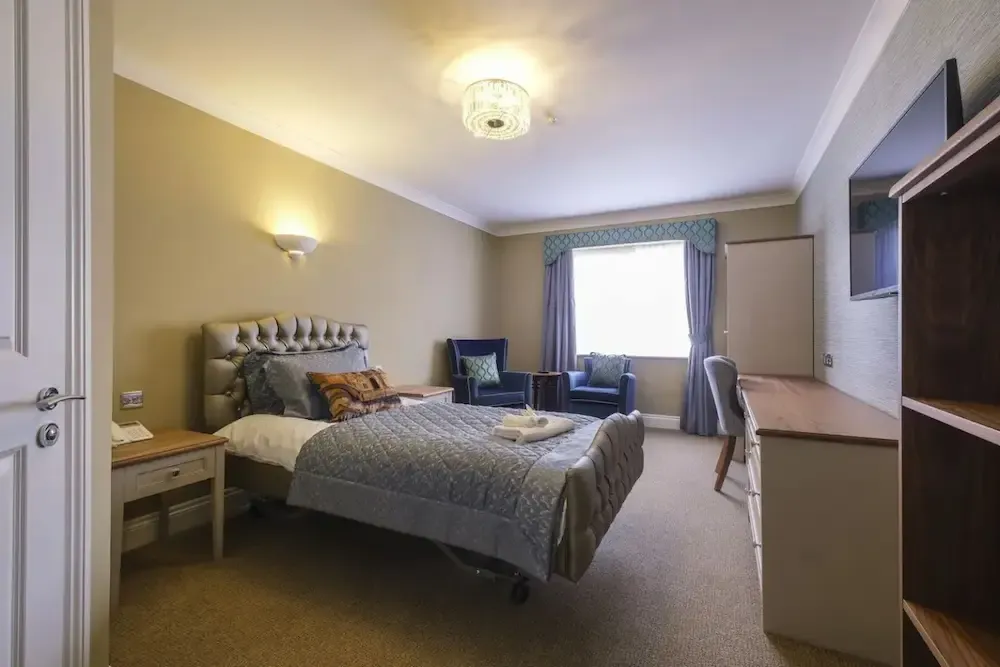
Silver Birch is packed with premium facilities, including a bar area and wonderfully landscaped gardens. On warm summer days, residents enjoy kicking back and relaxing in the home’s grounds.
Meanwhile, regular activities like arts and crafts, exercise classes, and movie nights ensure a vibrant atmosphere within the home. Residents’ hobbies and interests are often considered when organising these activities!
| Silver Birch at a glance: | |
|---|---|
| Type(s) of Care Offered | The main types of care offered here are residential, nursing, dementia and respite care |
| Cost of Care | Permanent care starts from £1,600 a week |
| CQC Rating | Good |
| Facilities, Services and Activities | An activity room, a bar, a café/restaurant, a cinema room, a computer room, communal and private dining areas, a family room, tranquil gardens, a hair and beauty salon, a library, a meditation area, outdoor terracing for relaxation, and a space for peace and quiet |
| Number of Beds | 75 |
| Is the Home Purpose Built? | Yes |
| Are Bills Included in the Price? | Yes |
| Are There En Suite Facilities? | All rooms have en-suite facilities |
| Which Care Home Provider Oversees This Home? | Alysia Caring |
Are you interested in viewing Silver Birch?
For availability and pricing, call 03330 916859.
Explore The UK’s Best Care Homes:
Use Lottie to find the best care homes in the UK by price, the care types available, facilities, activities and more:
Frequently Asked Questions
What is supported living for people with learning disabilities?
Supported living is a service that aims to help people with a wide range of support needs maintain their independence by being supported in their own homes. In supported living, people rent accommodation and are responsible for their bills and living costs, but are still given care on a regular basis.
What is respite care for learning disabilities?
Respite care provides short-term or temporary relief to a caregiver by providing a much-needed break from the challenges of caring for someone with a learning disability or similar needs. It can take place in a care home or in the home of the care recipient.
What professionals help with learning disabilities?
Some of the people involved in the care of somebody with learning disabilities include:
- Doctors
- Key workers
- Communication support workers
- Special educational needs coordinators
- Educational psychologists
- Paediatricians and paediatric occupational therapists
- Neurologists
How can you help adults with learning disabilities?
There is no one-size-fits-all approach to supporting adults with learning disabilities. Every individual is different and has different needs, so their support should reflect this and be tailored to them.
Some of the ways you can support adults with learning disabilities include:
- Understanding learning disabilities, along with identifying and assessing them
- Promoting better health and wellbeing, including through nutrition and physical health
- Providing personalised care and support that encourages independence
- Being aware of any risks, safeguarding and relevant legislation




